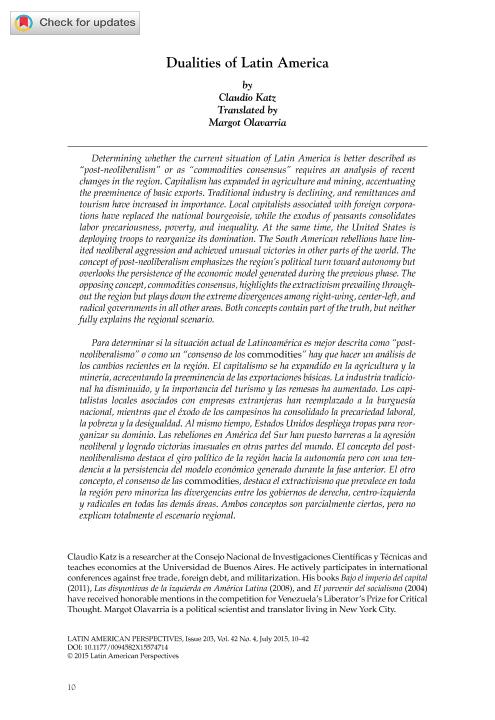Mostrar el registro sencillo del ítem
dc.contributor.author
Katz, Claudio Isaac

dc.date.available
2018-03-01T14:43:21Z
dc.date.issued
2015-07
dc.identifier.citation
Katz, Claudio Isaac; Dualities of Latin America; Sage Publications; Latin American Perspectives; 42; 4; 7-2015; 10-42
dc.identifier.issn
0094-582X
dc.identifier.uri
http://hdl.handle.net/11336/37516
dc.description.abstract
Determining whether the current situation of Latin America is better described as "post-neoliberalism" or as "commodities consensus" requires an analysis of recent changes in the region. Capitalism has expanded in agriculture and mining, accentuating the preeminence of basic exports. Traditional industry is declining, and remittances and tourism have increased in importance. Local capitalists associated with foreign corporations have replaced the national bourgeoisie, while the exodus of peasants consolidates labor precariousness, poverty, and inequality. At the same time, the United States is deploying troops to reorganize its domination. The South American rebellions have limited neoliberal aggression and achieved unusual victories in other parts of the world. The concept of post-neoliberalism emphasizes the region's political turn toward autonomy but overlooks the persistence of the economic model generated during the previous phase. The opposing concept, commodities consensus, highlights the extractivism prevailing throughout the region but plays down the extreme divergences among right-wing, center-left, and radical governments in all other areas. Both concepts contain part of the truth, but neither fully explains the regional scenario.
dc.description.abstract
Para determinar si la situación actual de Latinoamérica es mejor descrita como “postneoliberalismo” o como un “consenso de los commodities” hay que hacer un análisis de los cambios recientes en la región. El capitalismo se ha expandido en la agricultura y la minería, acrecentando la preeminencia de las exportaciones básicas. La industria tradicional ha disminuido, y la importancia del turismo y las remesas ha aumentado. Los capitalistas locales asociados con empresas extranjeras han reemplazado a la burguesía nacional, mientras que el éxodo de los campesinos ha consolidado la precariedad laboral, la pobreza y la desigualdad. Al mismo tiempo, Estados Unidos despliega tropas para reorganizar su dominio. Las rebeliones en América del Sur han puesto barreras a la agresión neoliberal y logrado victorias inusuales en otras partes del mundo. El concepto del postneoliberalismo destaca el giro político de la región hacia la autonomía pero con una tendencia a la persistencia del modelo económico generado durante la fase anterior. El otro concepto, el consenso de las commodities, destaca el extractivismo que prevalece en toda la región pero minoriza las divergencias entre los gobiernos de derecha, centro-izquierda y radicales en todas las demás áreas. Ambos conceptos son parcialmente ciertos, pero no explican totalmente el escenario regional.
dc.format
application/pdf
dc.language.iso
eng
dc.publisher
Sage Publications

dc.rights
info:eu-repo/semantics/openAccess
dc.rights.uri
https://creativecommons.org/licenses/by/2.5/ar/
dc.subject
INTEGRATION
dc.subject
LATIN AMERICA
dc.subject
NEOLIBERALISM
dc.subject
REBELLIONS
dc.subject
RULING CLASSES
dc.subject.classification
Economía, Econometría

dc.subject.classification
Economía y Negocios

dc.subject.classification
CIENCIAS SOCIALES

dc.title
Dualities of Latin America
dc.type
info:eu-repo/semantics/article
dc.type
info:ar-repo/semantics/artículo
dc.type
info:eu-repo/semantics/publishedVersion
dc.date.updated
2018-02-14T13:19:56Z
dc.identifier.eissn
1552-678X
dc.journal.volume
42
dc.journal.number
4
dc.journal.pagination
10-42
dc.journal.pais
Estados Unidos

dc.journal.ciudad
California
dc.description.fil
Fil: Katz, Claudio Isaac. Universidad de Buenos Aires; Argentina. Consejo Nacional de Investigaciones Científicas y Técnicas; Argentina
dc.journal.title
Latin American Perspectives

dc.relation.alternativeid
info:eu-repo/semantics/altIdentifier/doi/http://dx.doi.org/10.1177/0094582X15574714
dc.relation.alternativeid
info:eu-repo/semantics/altIdentifier/url/http://journals.sagepub.com/doi/10.1177/0094582X15574714
Archivos asociados
